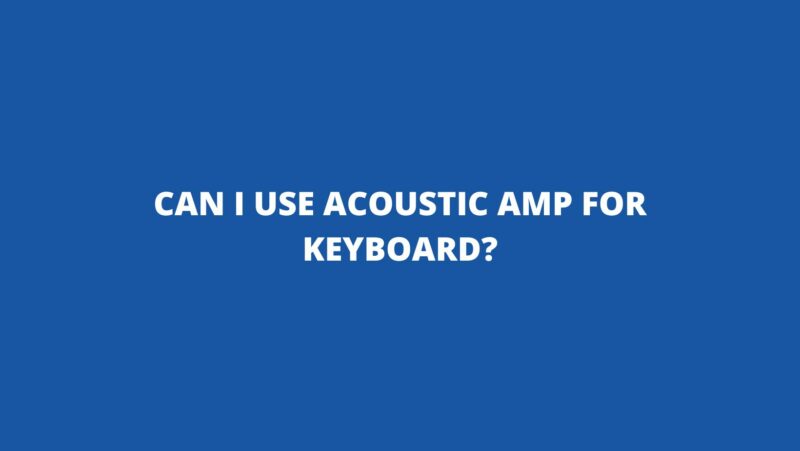In the realm of music amplification, versatility is a prized attribute. Musicians often seek equipment that can transcend traditional boundaries and accommodate a range of instruments. An intriguing exploration in this context is the use of an acoustic amplifier for keyboards. Acoustic amps are typically designed for acoustic guitars and other acoustic instruments, but can they effectively serve the sonic needs of keyboards? This article delves into the potential of using an acoustic amp for keyboards, considering the benefits, challenges, and creative opportunities that arise from this unconventional pairing.
Understanding Acoustic Amps:
Acoustic amplifiers are crafted to faithfully reproduce the natural, organic tones of acoustic instruments like guitars, violins, and mandolins. They prioritize clear sound reproduction, often featuring full-range speaker configurations, EQ controls, and feedback suppression technology to enhance the acoustic instruments’ nuances.
The Keyboard Amplification Dilemma:
Keyboards, encompassing digital pianos, synthesizers, and MIDI controllers, present a distinct set of tonal characteristics compared to acoustic instruments. While many keyboardists use dedicated keyboard amplifiers, the allure of using an acoustic amp as an alternative has grown in recent years.
Benefits of Using an Acoustic Amp for Keyboards:
1. Transparent Sound Reproduction: Acoustic amps are designed to provide a transparent, uncolored representation of the instrument’s sound. When used for keyboards, this transparency can be beneficial, particularly for genres and performances that require accurate sound reproduction.
2. Full-Range Sound: Acoustic amps often boast full-range speaker configurations, which can effectively handle the diverse frequency range of keyboard sounds. This results in a balanced sonic representation without any frequency bias.
3. Versatile Applications: Using an acoustic amp for keyboards can be advantageous in settings where both acoustic and electronic instruments are present. This flexibility allows musicians to perform with different instruments using a single amplifier setup.
4. Intimate Performances: Acoustic amps are ideal for smaller venues and intimate performances where a transparent and natural sound is desired. If you’re performing in a setting that requires a more organic sonic aesthetic, an acoustic amp might be a fitting choice.
Considerations and Challenges:
While using an acoustic amp for keyboards presents intriguing possibilities, several factors must be taken into account:
1. Tonality Compatibility: Acoustic amps emphasize the natural tonality of acoustic instruments, which might not always align with the diverse range of keyboard sounds. Some keyboard tones might not achieve their full potential when played through an acoustic amp.
2. Effects and Sound Shaping: Acoustic amps typically lack the extensive effects and sound-shaping capabilities found in dedicated keyboard amps. Keyboardists who rely heavily on effects might find an acoustic amp limiting in this aspect.
3. Volume and Power Handling: Depending on the size of the venue and the power requirements of your keyboard, an acoustic amp might not provide the necessary volume and projection. Keyboard amps are often designed with higher power handling to accommodate the dynamic range of keyboard sounds.
4. Sonic Versatility: Acoustic amps might excel at reproducing natural acoustic tones, but they might not be as versatile in handling the diverse sound palette that keyboards offer.
Conclusion:
Using an acoustic amp for keyboards is a creative venture that challenges conventional amplification norms. While acoustic amps excel at transparent sound reproduction and full-range sound representation, they might not fully address the wide tonal spectrum and effects needs of keyboards.
The decision to use an acoustic amp for keyboards should be guided by your musical preferences, performance context, and the desired sonic outcome. For keyboardists seeking an uncolored, transparent sound in smaller venues or intimate settings, an acoustic amp could offer a unique solution. However, for those who require a broader tonal palette, effects integration, and higher power handling, a dedicated keyboard amp might be more suitable.
Ultimately, the synergy between an acoustic amp and a keyboard depends on your willingness to explore unconventional avenues, adapt to the limitations, and embrace the unexpected sonic outcomes that arise from merging the worlds of acoustic amplification and keyboard expression.


